
Discover Every Nation and Their Leader in Civilization VII: Civ 7 Leaders List
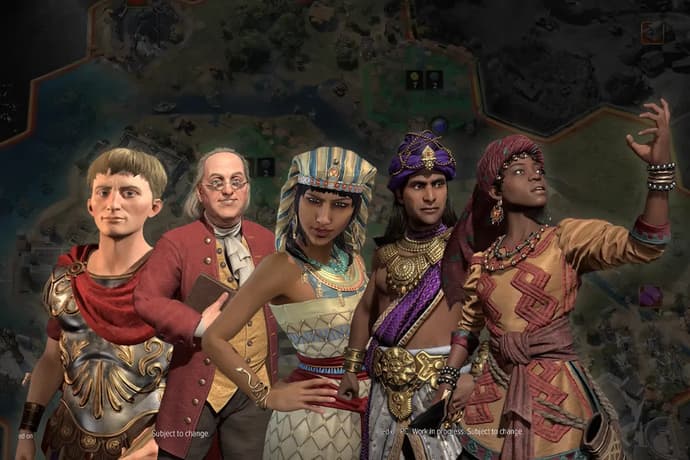
In Sid Meier's Civilization VII, players guide a civilization from its inception through various historical eras, making strategic decisions to build an empire that stands the test of time. A key aspect of this journey involves selecting a nation and its leader, each offering unique abilities and playstyles that influence the course of the game.
What are Nations and Leaders in Civilization VII

In previous installments of the Civilization series, each nation was paired with a specific leader, reflecting historical pairings. For example, in Civilization VI, Cleopatra led Egypt, and Genghis Khan led Mongolia. Each leader provided unique bonuses and abilities that complemented their nation's strengths, encouraging players to adopt strategies aligned with historical contexts.
In Civilization VII, this dynamic has evolved. Leaders are no longer tied to specific civilizations; instead, players can pair any leader with any nation, allowing for unprecedented strategic flexibility and creative combinations. We recently described all the known changes in Civ 7 — this change enables players to experiment with various leader-nation pairings, crafting unique strategies and exploring alternative historical scenarios.
Civilization VII Leaders Table

I have created a table with all the civilization leaders for viewing under the principle "Leader–Nation–Attributes–Ability" followed by sections dedicated to each leader, highlighting their unique abilities, attributes, agendas, and starting biases.
Leader | Civilization | Attributes | Ability |
Amina | Hausa | Economic, Militaristic | Warrior-Queen of Zazzau |
Ashoka (World Renouncer) | Maurya Empire | Expansionist, Diplomatic | Dhammaraja |
Ashoka (World Conqueror) | Maurya Empire | Militaristic, Diplomatic | Daveraja |
Augustus | Roman Empire | Cultural, Expansionist | Imperium Maius |
Benjamin Franklin | American Civilization | Diplomatic, Scientific | The First American |
Catherine the Great | pa’Russia | Cultural, Scientific | Star of the North |
Charlemagne | Holy Roman Empire | Militaristic, Scientific | Father of Europe |
Confucius | China | Expansionist, Scientific | Ceju |
Friedrich (Oblique) | Prussia | Scientific, Militaristic | Berlin Academy |
Friedrich (Baroque) | Prussia | Cultural, Militaristic | Hohenfriedberger Marsch |
Harriet Tubman | American Civilization | Diplomatic, Militaristic | Combahee Raid |
Hatshepsut | Egypt | Cultural, Economic | God's Wife of Amun |
Himiko (Queen of Wa) | Yamatai | Diplomatic, Scientific | Friend of Wei (Base Game) |
Himiko (High Shaman) | Yamatai | Cultural, Diplomatic | Miko of Amaterasu |
Ibn Battuta | Morocco | Expansionist, Wildcard | The Marvels of Traveling |
Isabella | Spain | Expansionist, Economic | Seven Cities of Gold |
José Rizal | Philippines | Cultural, Diplomatic | Pambansang Bayani |
Lafayette | France | Cultural, Diplomatic | Hero of Two Worlds |
Machiavelli | Italy | Diplomatic, Economic | Il Principe |
Napoleon (Emperor) | France | Economic, Diplomatic | Empereur des Français |
Napoleon (Revolutionary) | France | Militaristic, Cultural | La Grande Armée |
Pachacuti | Inca | Economic, Expansionist | Earth Shaker |
Tecumseh | Shawnee | Diplomatic, Militaristic | Nicaakiyakoolaakwe |
Trung Trac | Vietnam | Militaristic, Scientific | Hai Bà Trưng |
Xerxes (King of Kings) | Persian Empire | Militaristic, Economic | Crusher of Rebellions |
Xerxes (The Achaemenid) | Persian Empire | Cultural, Economic | Silk Road |
In Civilization 7, there are 21 unique leaders and a total of 26 leaders, including the personas of Ashoka, Friedrich, Himiko, Napoleon, and Xerxes. Each leader leads their nation and possesses unique abilities and attributes. The characteristics and descriptions of the leaders are based on data from the official Civilization2kCom website.
Civilization 7 Roadmap: Upcoming Nations and Leaders in Future Updates

In addition to the leaders already available in the game, detailed below, four new leaders will be introduced: two known ones in March and two yet-to-be-revealed in April.
Known leaders and their nations:
- Ada Lovelace – Great Britain
- Simón Bolívar – Bulgaria, Nepal
The information about the leaders comes from the updated roadmap for this year. Firaxis, the game's developers, are prioritizing bug fixes in early March, along with a series of free updates and, of course, DLCs, which will be introduced as additional purchasable content.
TIME FRAME | UPDATE TYPE | CONTENT |
Ongoing, February 2025 (Post-Launch) | Free Update | Bug fixes, balance changes, UI improvements |
Free Update | New events, challenges, and gameplay improvements | |
Multiplayer | Teams mode, 8-player multiplayer for all Ages, starting/ending Age options, wider map variety, hot seat mode | |
Modding | Modding tools and community support | |
Early March 2025 | Paid DLC | Crossroads of the World – Release 1Leader: Ada LovelaceCivs: Carthage, Great BritainExtras: 4 Natural Wonders |
Free Update | Update 1.1.0 – Natural Wonder Battle EventNew Wonder: Bermuda Triangle | |
Late March 2025 | Paid DLC | Crossroads of the World – Release 2Leader: Simón BolívarCivs: Bulgaria, Nepal |
Free Update | Marvelous Mountains EventNew Wonder: Mount Everest | |
April – Sept 2025 | Paid DLC | Right to Rule CollectionNew Content: 2 Leaders, 4 Civilizations, 4 World Wonders |
October 2025+ | Ongoing Support | Further content, updates, and improvements |
As of the time of writing, Firaxis is actively assuring users that all bugs related to UI and balance will be fixed in the March patch. Players are complaining about significant issues in the game at launch, given its rather hefty price.
Amina – Hausa
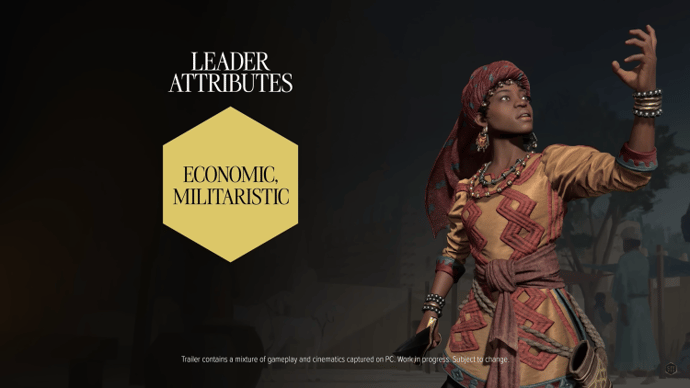
Credit: Civilization VII First Look Video
Leader Amina leads the Hausa civilization in Civilization VII.
The warrior queen Amina rose to power when the trade routes of the Sahara began to provide access to a larger world. A callous and single-minded conqueror, she led the Hausa people on a campaign of expansion across the precolonial Sahel. She was said to take a lover in every city she vanquished, only to kill him in the morning. In uniting the lands, Amina conquered according to her own fashion – with a sword, not a man, at her side.
Unique Ability: Warrior-Queen of Zazzau
- Increased Resource Capacity in Cities.
- Increased Gold per Age for each Resource assigned to Cities.
- Increased Combat Strength for all Units on Plains and Desert Tiles.
Amina's strengths lie in her economic and militaristic prowess. Her agenda, "Desert of the Warrior Queen," makes her a strong contender for domination in desert and plains regions, fostering either rivalry or alliance depending on a player's settlement strategy. Her starting biases ensure she thrives in these harsh terrains.
Ashoka (World Renouncer) — Maurya Empire
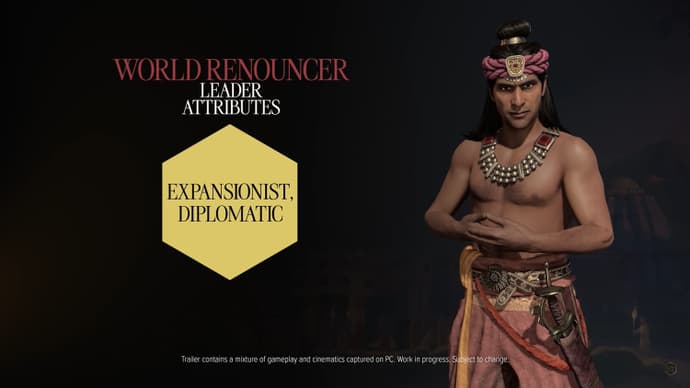
Credit: Civilization VII First Look Video
Ashoka is the emperor of the Maurya Empire in Civilization VII.
Lauded as a chakravartin, a "wheel-turning monarch," for spreading Buddhism, Ashoka had a checkered past. Known for his ferocity as the emperor of the Maurya, Ashoka experienced a profound revelation upon witnessing his slaughter of the Kalinga in 260 BCE. Afterward, he spread a message of non-violence around his lands and abroad, seeking to steer others away from his own legacy of destruction.
Unique Ability: Dhammaraja
- Adds Food in Cities for excess Happiness beyond a set amount.
- Increased Food in all Settlements during a Celebration.
- All Buildings gain a Happiness adjacency for all Improvements.
Ashoka's strengths lie in diplomacy and expansion, making him a formidable leader for those pursuing peaceful growth. His agenda, "Without Sorrow," rewards players who maintain high Happiness while penalizing those who neglect it. Unlike some leaders, he has no specific terrain preference, allowing for flexible expansion strategies.
Ashoka (World Conqueror) — Maurya Empire
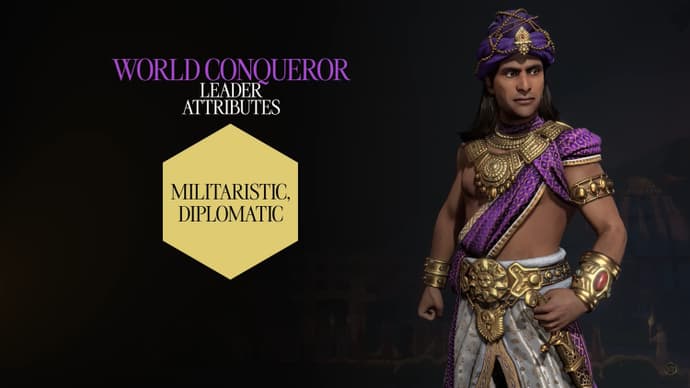
Credit: Civilization VII First Look Video
Much is made of how Ashoka, the bloodthirsty emperor of the Maurya, embraced non-violence and Buddhism. But what of Ashoka before this revelation? Had he not experienced a profound revelation upon witnessing his own troops' bloody slaughter of the Kalinga around 260 BCE, his legacy today may be one of conquest by the sword, rather than the mind.
Unique Ability: Devaraja
- Increased Production in Cities for excess Happiness beyond a set amount.
- Increased Production in Settlements not founded by you.
- Declaring a Formal War grants a Celebration.
- Large increase in Combat Strength against Fortified Districts for all Units during a Celebration.
This alternate persona of Ashoka focuses on militaristic and diplomatic strengths, allowing for a more aggressive playstyle. His agenda, "Without Regret," shifts relationships based on land control, making him a dynamic force in any campaign. Like his peaceful counterpart, he has no specific terrain bias.
Augustus — Roman Empire
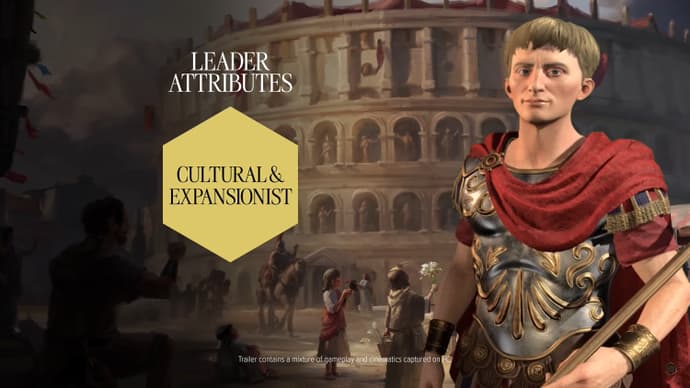
Credit: Civilization VII First Look Video
Augustus leads the Roman Empire in Civilization VII.
Emerging from Rome's civil wars, Augustus consolidated the fractious republic into an empire stretching from the North Sea to Egypt. Despite the Roman fear of tyrants, he achieved sole power while outwardly maintaining the old republic's structures. He expanded Rome's borders via client states and a reorganized army, reformed the tax code, and inaugurated the imperial cult. The modern image of Imperial Rome is largely the one of Augustus' vision.
Unique Ability: Imperium Maius
- Adds Production in the Capital for every Town.
- Increased Gold towards purchasing Buildings in Towns.
- Can purchase Culture Buildings in Towns.
Augustus excels in cultural and expansionist strategies, making him a well-rounded leader for those looking to balance development and territorial growth. His agenda, "Restitutor Orbis," impacts relationships based on the number of Towns and Cities in a player's empire, encouraging strategic settlement planning.
Benjamin Franklin — American Civilization

Credit: Civilization VII First Look Video
Benjamin Franklin leads the American Civilization in Civilization VII.
Few figures in colonial America were as influential as Benjamin Franklin. Starting as a humble printer, he quickly rose to prominence as a newspaper publisher. By 1747, he had entered politics, playing a key role as one of the Founding Fathers in drafting and signing the Declaration of Independence. Beyond his political career, Franklin was a true polymath, making significant contributions to science, particularly in the fields of electricity and oceanography.
Unique Ability: The First American
- Increased Science per Age on Production Buildings in Cities.
- Increased Production towards constructing Production Buildings.
- Increased Science per Age from active Endeavors you started or supported.
- Can have multiple Endeavors of the same type active at a time.
Franklin’s strengths lie in diplomacy and scientific progress, making him a valuable leader for those focusing on research and civic engagement. His agenda, Civic Virtue, affects relationships based on shared government policies, encouraging players to align their political structures with his to maintain good relations. Without a specific terrain bias, Franklin offers flexibility in settlement and expansion strategies.
Catherine the Great — Russia

Credit: Civilization VII First Look Video
Catherine the Great leads Russia in Civilization VII.
Born a German princess, Catherine the Great ascended to the Russian throne in 1762 after overthrowing her husband. Her reign was defined by a strong vision of modernization, as she introduced new models of law and governance while expanding Russia’s influence through both war and diplomacy. An intellectual at heart, Catherine championed the arts and sciences, playing a crucial role in fostering the Russian Enlightenment and promoting cultural innovation.
Unique Ability: Star of the North
- Increased Culture per Age on displayed Great Works.
- Buildings with Great Work slots gain an additional slot.
- Cities settled in Tundra gain Science equal to a percentage of their Culture per turn.
Catherine excels in cultural and scientific advancement, making her a powerful leader for those focusing on Great Works and intellectual progress. Her agenda, Dusha, influences relationships based on the number of Great Works a player possesses, encouraging competition for cultural dominance. With a starting bias towards tundra, she is particularly well-suited for settling and thriving in harsh northern environments.
Charlemagne — Holy Roman Empire

Credit: Civilization VII First Look Video
Charlemagne leads the Holy Roman Empire in Civilization VII.
Charlemagne, or Charles the Great, rose to power as King of the Franks in 768 CE, uniting a diverse and often restless population. Through a blend of old traditions and innovative governance, he expanded his empire across Europe, laying the foundations for what would become the Holy Roman Empire. Beyond his military and political achievements, Charlemagne’s deep curiosity fostered the Carolingian Renaissance, turning his court into a thriving center for diplomacy and intellectual exchange.
Unique Ability: Father of Europe
- Military and Science Buildings receive a Happiness adjacency for Quarters.
- Gain a set number of free Cavalry Units, once unlocked, when entering a Celebration.
- Increased Combat Strength for Cavalry Units during a Celebration.
Charlemagne's leadership combines militaristic strength with scientific advancement, making him well-suited for players who seek both conquest and progress. His agenda, The Golden Shepherd, shapes his diplomatic stance around Celebrations, favoring leaders who trigger them frequently while distancing himself from those who do not. With a starting bias towards rivers, he thrives in fertile, well-connected regions that support both expansion and infrastructure.
Confucius — China
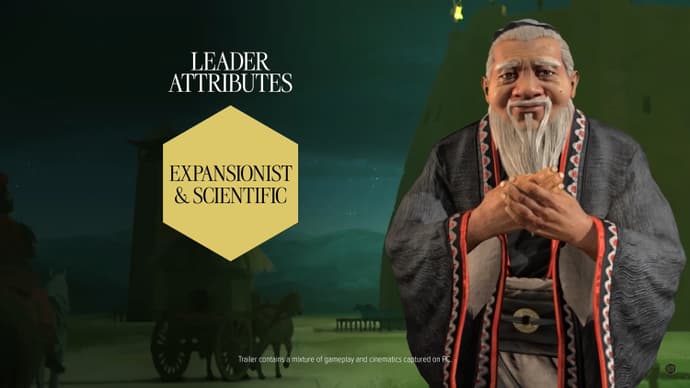
Credit: Civilization VII First Look Video
Confucius leads China in Civilization VII.
Confucius, also known as Kong Fu Zi, rose to prominence during the Zhou Dynasty, dedicating his later years to writing after a career in government. At a time when political rulers vied for power and often succumbed to corruption, he championed principles of order, harmony, and tradition. His teachings emphasized hard work and social roles, shaping East Asian society for centuries and laying the foundation for Confucian thought.
Unique Ability: Keju
- Increased Growth Rate in Cities.
- Increased Science from Specialists.
Confucius excels in both expansion and scientific advancement, making him an ideal leader for those who focus on city development and intellectual progress. His agenda, Guanxi, rewards civilizations that prioritize Specialists, strengthening relationships with those who invest in knowledge while distancing him from those who do not. With a starting bias toward grasslands, he thrives in fertile regions that support population growth and scholarly pursuits.
Friedrich (Oblique) — Prussia

Credit: Civilization VII First Look Video
Friedrich the Great leads Prussia in Civilization VII.
Friedrich the Great’s ascension to militarized Prussia might appear contradictory at first. In his youth, he was more fascinated by art and literature than warfare. However, upon taking the throne, he proved to be an astute military strategist, expanding Prussia’s borders and reinforcing its reputation for martial prowess. Despite his aggressive expansionism, Friedrich maintained his love for the arts, balancing his rule with intellectual patronage.
Unique Ability: Berlin Academy (Base Game)
- Army Commanders start with the Merit Commendation (increased Command Radius range).
- Gain an Infantry Unit when you construct a Science Building.
Friedrich’s leadership in the base game is defined by his dual emphasis on military and scientific development. His agenda, To Arms!, aligns him with militarily dominant civilizations while alienating those with weaker armies.
Friedrich (Baroque) — Prussia
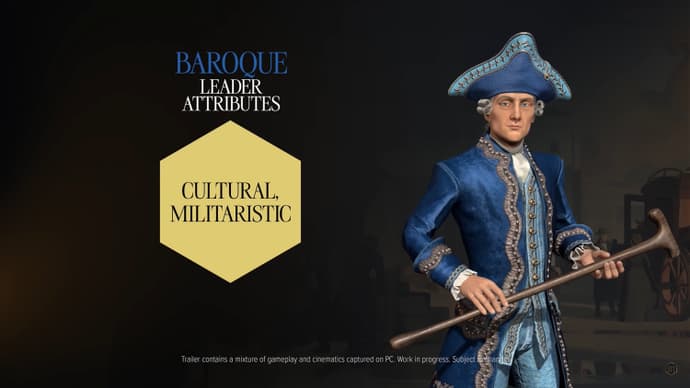
Credit: Civilization VII First Look Video
Friedrich the Great’s rise to power in militarized Prussia may seem paradoxical. While he was a sharp military strategist and advocate of Prussian aggression, he also had a deep love for the arts. From an early age, he was drawn to philosophy, music, and literature, even composing his own works and engaging with the greatest minds of the era. Yet he never abandoned his military ambitions, blending creativity with the strategic discipline required to lead on the battlefield.
Unique Ability: Hohenfriedberger Marsch
- Gain a Great Work upon capturing a Settlement for the first time.
- Gain an Infantry Unit when you construct a Culture Building.
This persona highlights Friedrich’s dual nature, intertwining his cultural pursuits with his military prowess. His agenda, Parisian Sensibilities, rewards civilizations that build Wonders in their capital while diminishing relations with those who prioritize ordinary buildings.
With strong Cultural and Militaristic attributes, Friedrich, in his Baroque persona, thrives in a hybrid playstyle that fuses artistic grandeur with battlefield dominance. His adaptability ensures he remains a formidable leader in both war and cultural supremacy.
Harriet Tubman — American Civilization
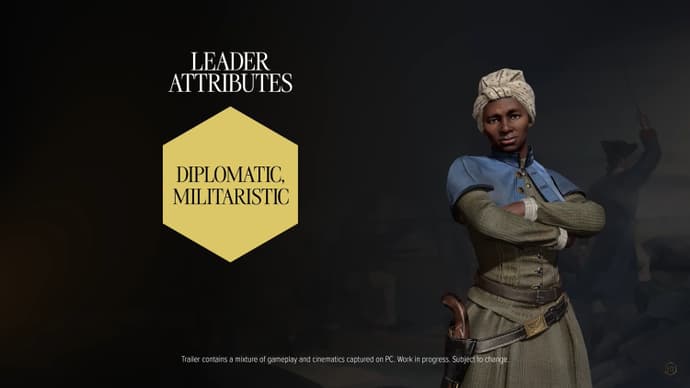
Credit: Civilization VII First Look Video
Harriet Tubman leads the American Civilization in Civilization VII.
Harriet Tubman’s journey from enslaved childhood to legendary freedom fighter is one of resilience and defiance. Born Araminta "Minty" Ross in Maryland, she escaped slavery and became a conductor on the Underground Railroad, leading countless others to freedom. Her courage extended to the battlefield, where she led the Union Army’s raid on Combahee Ferry, freeing over 700 enslaved people. Later in life, she fought for women’s suffrage and civil rights, cementing her legacy as a champion of justice.
Unique Ability: Combahee Raid
- Increased Influence towards Initiating Espionage Actions.
- Gain a set amount of War Support on all wars declared against you.
- Units ignore Movement penalties from Vegetated tiles.
Harriet Tubman’s abilities reflect her tactical prowess and determination. Her agenda, Veracity, rewards those who engage in formal warfare while penalizing surprise aggressors. With strong Diplomatic and Militaristic attributes, she thrives in conflicts where justice is on her side. Her affinity for Vegetated terrain represents the covert routes she once navigated, making her an unpredictable and formidable leader.
Hatshepsut
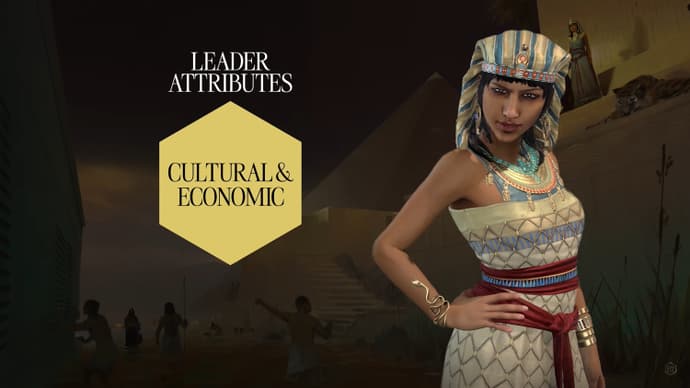
Credit: Civilization VII First Look Video
Hatshepsut leads Egypt in Civilization VII.
Hatshepsut’s reign in the early 14th century BCE marked an era of prosperity and grandeur for Egypt. Through extensive trade networks, she secured wealth from Punt and the Mediterranean, reinforcing Egypt’s economic dominance. This influx of riches fueled her ambitious construction projects, leaving behind architectural marvels that immortalized her legacy. By balancing diplomacy, commerce, and cultural achievements, Hatshepsut ensured her rule would be remembered as one of Egypt’s golden ages.
Unique Ability: God's Wife of Amun
- Adds Culture for every imported Resource.
- Increased Production towards the construction of Buildings and Wonders in Cities adjacent to Navigable Rivers.
Hatshepsut’s leadership reflects her focus on trade and monumental architecture. Her agenda, Wonders of Iteru, encourages competition in wonder-building—she favors those who construct fewer Wonders while distrusting those who surpass her in grandeur. With strong Cultural and Economic attributes, she thrives in river-adjacent cities, turning Egypt into a beacon of civilization and splendor.
Himiko (Queen of Wa) — Yamatai
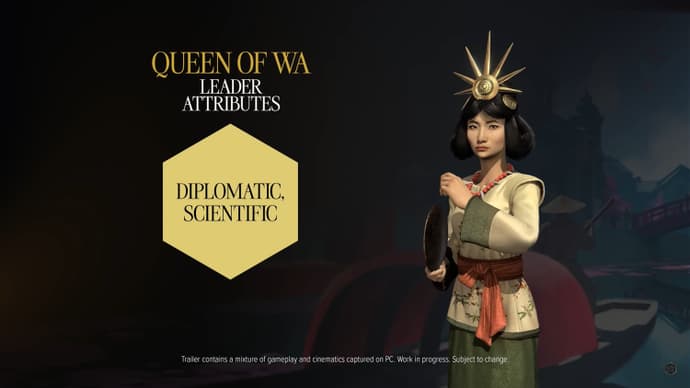
Credit: Civilization VII First Look Video
Himiko leads Yamatai in Civilization VII.
As queen of Yamatai, Himiko wielded a unique blend of political acumen and spiritual influence to unify her people. Ancient records describe her as both a skilled diplomat and a shamanic ruler, earning recognition from the Chinese kingdom of Cao Wei as a "friend of Wei." Though much of her life is shrouded in mystery, her legacy endures in Japanese folklore as a leader who balanced diplomacy, intellect, and mystical charisma.
Unique Ability: Friend of Wei
- Gain a Unique Endeavor called Friend of Wei that can be performed in an Alliance to grant increased Science to both allies.
- Can support Endeavors for free.
- Adds Science per Age for every leader she is Friendly or Helpful with.
Himiko’s leadership in the base game emphasizes her diplomatic and scientific strengths. Her agenda, Yamatai, favors settlements that prioritize Science and Gold over Culture and Happiness, reflecting her pragmatic governance and alliances.
Himiko (High Shaman) — Yamatai

Credit: Civilization VII First Look Video
Beyond politics, Himiko was also revered as a religious figure, possibly a shaman of Amaterasu, the sun goddess. Some accounts claim she ruled through divine magic, enthralling her subjects with mystical power. Whether through faith or persuasion, Himiko's aura of authority shaped the identity of early Japan.
Unique Ability: Miko of Amaterasu
- Increased Happiness per Age on Happiness Buildings.
- Increased Production towards constructing Happiness Buildings.
- Gain increased Culture but slightly reduced Science, with greater effects during a Celebration.
This persona highlights Himiko’s cultural and spiritual influence. Her Shaman Queen agenda inverts her base-game preferences—she favors settlements that focus on Culture and Happiness while distrusting those that prioritize Science and Gold.
With no starting biases, Himiko’s adaptability allows her to lead through diplomacy, intellect, or faith, making her an enigmatic yet formidable ruler in any era.
Ibn Battuta — Morocco
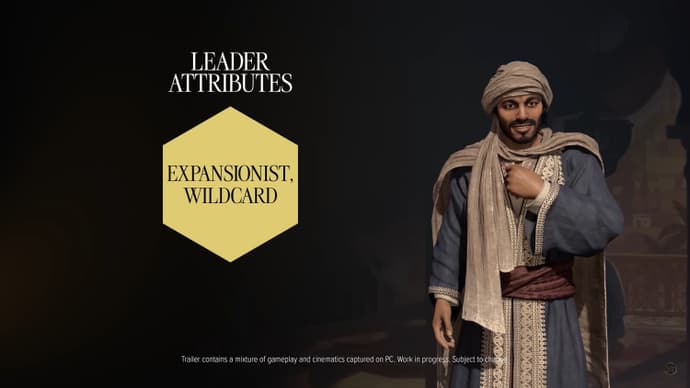
Credit: Civilization VII First Look Video
Ibn Battuta leads Morocco in Civilization VII.
Ibn Battuta, the famed Moroccan scholar and traveler, embarked on an unparalleled journey across Africa, Asia, and Europe in 1325. Initially setting out for the Hajj pilgrimage to Mecca, he extended his travels to explore the vast expanse of the Muslim world, the Dar al-Islam. His detailed travelogue, The Rihla, offers invaluable insights into the cultures, societies, and trade networks of his time, solidifying his legacy as one of history’s greatest explorers.
Unique Ability: The Marvels of Traveling
- Gains multiple Attribute points after the first Civic in every Age.
- Increased Sight for all Units.
- Gain a Unique Endeavor called Trade Maps, which gradually reveals other Leaders' explored areas.
Ibn Battuta’s leadership is defined by his boundless curiosity and adaptability. His agenda, Far and Wide, rewards leaders who uncover the most Fog of War tiles, while he remains skeptical of those who explore the least.
With a Wildcard attribute and a preference for open terrain, Ibn Battuta excels in an expansive, discovery-driven strategy, making him an ideal leader for those who seek knowledge and adventure.
Isabella — Spain

Credit: Civilization VII First Look Video
Queen Isabella leads Spain in Civilization VII.
Queen Isabella of Spain pursued a singular goal—expanding her power. Domestically, she solidified Spain as a Catholic stronghold through the Inquisition and the Reconquista. Abroad, her sponsorship of overseas exploration laid the foundation for a vast Spanish empire in the New World. Cunning and relentless, Isabella shaped Spain’s future through conquest, faith, and wealth.
Unique Ability: Seven Cities of Gold
- Gain Gold upon discovering a Natural Wonder, with increased rewards if the Wonder is in Distant Lands.
- Additional tile yields from Natural Wonders.
- Additional Gold towards purchasing Naval Units.
- Reduced Gold maintenance costs for Naval Units.
Isabella’s leadership emphasizes economic strength and territorial expansion. Her agenda, Wonderlust, makes her wary of civilizations controlling Natural Wonders while favoring those without them.
With Economic and Expansionist attributes, Isabella thrives in maritime exploration and resource-driven expansion, making her a formidable leader for those seeking wealth and dominion over land and sea.
José Rizal — Philippines

Credit: Civilization VII First Look Video
José Rizal leads the Philippines in Civilization VII.
A revered national hero of the Philippines, José Rizal was a scholar, writer, and activist who championed Filipino dignity and autonomy. While living in Europe, he openly criticized Spanish colonial rule through his writings, advocating for peaceful reform and equal rights. Despite his nonviolent stance, he was executed by Spanish authorities—yet his revolutionary ideals lived on, inspiring generations of Filipinos in their fight for independence.
Unique Ability: Pambansang Bayani
- When gaining rewards from a Narrative Event, gain additional Culture and Gold per Age.
- Increased Celebration duration and additional Happiness from Celebrations.
- Has additional Narrative Events.
Rizal’s leadership reflects his intellectual and diplomatic approach to change. His agenda, Kapwa, favors leaders who actively engage in positive endeavors while opposing those who impose sanctions, emphasizing cooperation and mutual progress.
With Cultural and Diplomatic attributes, and a preference for Tropical terrain, Rizal thrives in a civilization focused on knowledge, unity, and cultural resilience, making him a unique leader for those who seek reform through ideas rather than force.
Lafayette — France

Credit: Civilization VII First Look Video
Marquis de Lafayette leads France in Civilization VII.
Gilbert du Motier, the Marquis de Lafayette, left an indelible mark on both sides of the Atlantic. As a military leader in the American Revolution and a statesman in France, he navigated the turbulent waters between monarchy and revolution. Though his legacy is one of heroism and reform, perhaps his greatest accomplishment was surviving—and shaping—one of history’s most volatile eras.
Unique Ability: Hero of Two Worlds
- Gains a Unique Endeavor called Reform, which grants an additional Social Policy slot. Supporting this Endeavor also grants the other Leader an additional Social Policy slot.
- Increased Combat Strength for every Tradition (but not Policy) slotted in the Government.
- Increased Culture and Happiness per Age in Settlements, with greater effects in Distant Lands.
Lafayette’s leadership blends diplomacy, governance, and cultural influence. His agenda, French Quarters, favors civilizations that fully develop their Urban Districts while disfavoring those that neglect them.
With Cultural and Diplomatic attributes, and a preference for Coastal settlements, Lafayette excels at fostering progress and cooperation, making him an ideal leader for those who seek stability amidst change.
Machiavelli — Italy

Credit: Civilization VII First Look Video
Niccolò Machiavelli leads Italy in Civilization VII.
Niccolò Machiavelli, the Florentine writer, diplomat, and philosopher, remains infamous for his ruthless political insights. He believed that the most effective rulers were those willing to do whatever was necessary to secure and maintain power. His unflinching pragmatism earned him the enmity of both the Catholic Church and the ruling Medici family, yet his ideas endured through The Prince, ensuring that, in the end, he had the last word.
Unique Ability: Il Principe
- Gain additional Influence per Age.
- Earn Gold per Age when your Diplomatic Action proposals are accepted, with even greater rewards if they are rejected.
- Ignore Relationship requirements when declaring Formal Wars.
- Can Levy Military Units from City-States even when not Suzerain.
Machiavelli’s leadership rewards cunning diplomacy and strategic opportunism. His agenda, The Spider, means he values leaders who engage in conflict—so long as he is not their target.
With Diplomatic and Economic attributes, Machiavelli thrives in a world of shifting alliances and political maneuvering, making him an ideal leader for those who embrace realpolitik and deception to shape history.
Napoleon (Emperor) — France

Credit: Civilization VII First Look Video
Napoleon Bonaparte leads France in Civilization VII.
Napoleon Bonaparte, one of history’s most renowned leaders, rose from his humble Corsican beginnings to reshape Europe through his military genius and political acumen. After staging a coup in 1799, he became France’s First Consul, and by 1804, crowned himself Emperor. His reign was marked by sweeping civic reforms and a series of wars that spanned from Spain to Russia. He established the Continental System, aiming to weaken France’s enemies and bolster its economy. Though his empire ultimately fell, Napoleon’s legacy as a master tactician and reformer endures.
Unique Ability: Empereur des Français
- Gains a Unique Diplomatic Action that reduces the Trade Route capacity for a target civilization and causes massive Grievances.
- Increased Gold per Age for every leader you're Unfriendly or Hostile with.
Napoleon’s leadership is characterized by diplomatic and economic strategies, making him a formidable force both in war and in negotiation. His agenda, Napoleonic Code, rewards civilizations with smaller standing armies and punishes those with the largest standing navies, reflecting his focus on military dominance.
With Diplomatic and Economic attributes, Napoleon thrives by manipulating trade routes, exploiting conflicts, and maximizing gold from rivalries, making him a leader well-suited for those seeking to dominate through strategic alliances and economic strength.
Napoleon (Revolutionary) — France
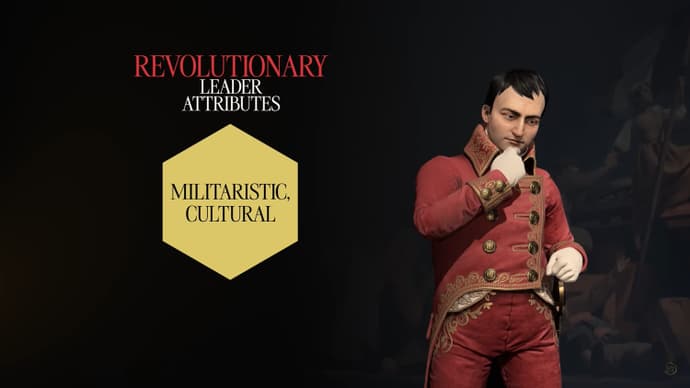
Credit: Civilization VII First Look Video
Napoleon Bonaparte, a name forever tied to military genius and political transformation, began his rise in the tumult of the French Revolution. Starting as an artillery officer, his rapid ascent culminated in a coup that made him France’s First Consul in 1799. By 1804, he crowned himself Emperor of the French and led a series of wars across Europe, from Spain to Russia. His military innovations, particularly his use of artillery and his strategic acumen, reshaped Europe and solidified his reputation as one of history’s greatest tacticians.
Unique Ability: La Grande Armée
- Increased Movement for All Land Units.
- Defeating an enemy Unit provides Culture equal to a percentage of its Combat Strength.
Napoleon’s Revolutionary persona emphasizes military prowess and cultural dominance. His agenda, Culture from Conquest, rewards those with high Culture per Turn and punishes civilizations that form alliances with others, reflecting his drive for expansion and cultural hegemony.
With Cultural and Militaristic attributes, Napoleon, Revolutionary, thrives through aggressive conquest, using his military superiority to fuel his culture while keeping other powers at bay. His leadership suits players who favor rapid expansion and leveraging culture as a result of military success.
Pachacuti — Inca
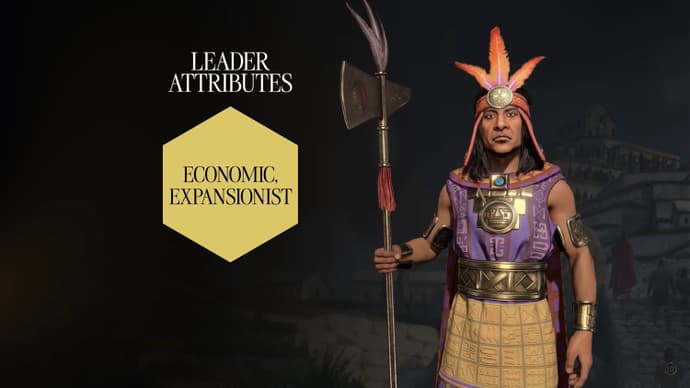
Credit: Civilization VII First Look Video
Pachacuti leads the Inca in Civilization VII.
Pachacuti rose to power in 1438 after defending the kingdom of Cuzco from invasion, soon setting out to conquer neighboring regions. A leader with equal military and political skill, he offered gifts and promises of prosperity to those he could not take by force, ensuring their loyalty. The Inca Empire, though short-lived following his death, left an indelible mark on the Andean world, with its legacy enduring long after the arrival of the Spanish.
Unique Ability: Earth Shaker
- All Buildings gain a Food adjacency for Mountains.
- Specialists adjacent to Mountains do not require Happiness maintenance.
Pachacuti’s leadership focuses on economic growth and expansion. His agenda, Mountain King, sees him favor civilizations with fewer Mountains while challenging those with many, making him a powerful figure for players who value territory with mountainous advantages.
With Economic and Expansionist attributes, Pachacuti excels in building a resource-rich empire, making him an ideal leader for players who wish to control key land and strategic positioning in the mountains.
Tecumseh — Shawnee
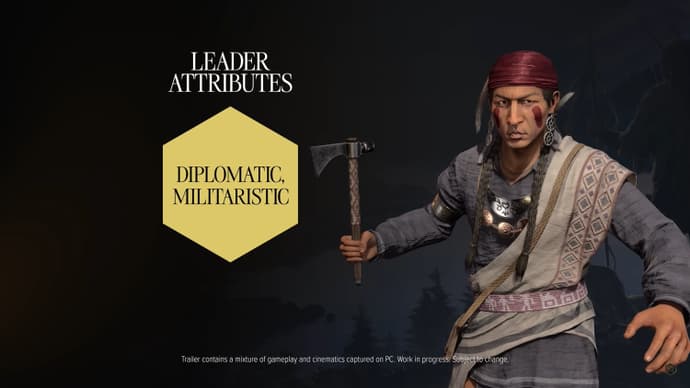
Credit: Civilization VII First Look Video
Tecumseh leads the Shawnee in Civilization VII.
Tecumseh, a Shawnee chief known as "the one who leaps across the great expanse," rose to prominence as a powerful force resisting the westward expansion of the early United States. Alongside his brother Tenskwatawa, he sought to unite various indigenous tribes in opposition to the encroaching settlers. Despite his death during the War of 1812, Tecumseh’s legacy of cultural perseverance and resistance to foreign influence endures.
Unique Ability: Nicaakiyakoolaakwe
- Increased Food and Production per Age in Settlements for every City-State you are Suzerain of.
- Increased Combat Strength for all your Units for every City-State you are Suzerain of.
Tecumseh's leadership style is deeply diplomatic and militaristic, thriving through his alliances with City-States. His agenda, Suzerain of the World, reflects his disdain for the dispersal of Independent City-States while rewarding civilizations that avoid aggressive expansion against them.
With Diplomatic and Militaristic attributes, Tecumseh excels in building strong alliances with City-States, gaining both cultural and military advantages as he expands his influence. His leadership benefits players who focus on diplomacy and strategic military strength through the support of local allies.
Trung Trac — Vietnam
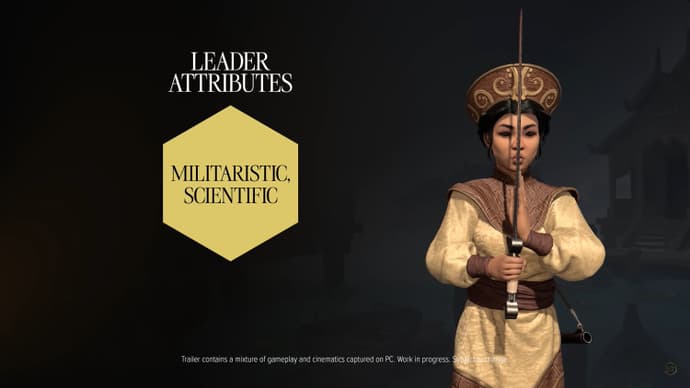
Credit: Civilization VII First Look Video
Trung Trac leads Vietnam in Civilization VII.
Trung Trac, alongside her sister Trưng Nhị, led a rebellion against the Han Dynasty in what is now Vietnam. After her husband’s death, Trưng Trắc took up arms with her sister, gaining independence for a brief period before the Han forces launched a counteroffensive. The two sisters are revered as national heroines and divine figures, symbolizing the strength and determination of Vietnamese independence.
Unique Ability: Hai Bà Trưng
- Gain a set number of free Promotions on your first Commander.
- Commanders gain additional experience.
- Increased Science in Cities on Tropical tiles, with the bonus heightened during any Formal War declared.
Trung Trac's leadership is both Militaristic and Scientific, combining strong military tactics with a focus on technological advancement. Her agenda, Van Minh, influences her relationships based on the number of promotions Commanders have, favoring players with fewer promotions while showing hostility toward those with the most.
With Militaristic and Scientific attributes, Trung Trac excels in military leadership, especially during wars, while also driving scientific progress through her control of Tropical territories. This makes her an ideal leader for players seeking to balance military conquests with technological development.
Xerxes (King of Kings) — Persian Empire
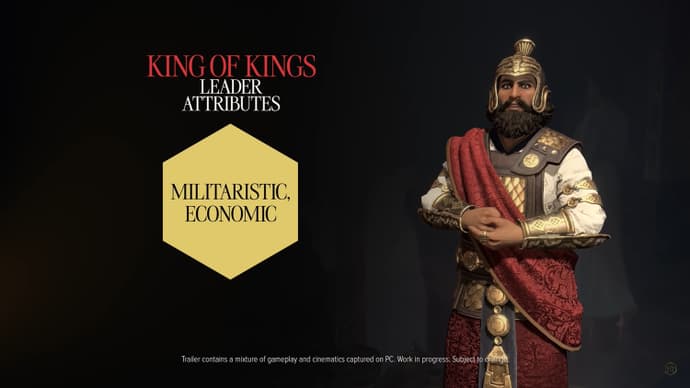
Credit: Civilization VII First Look Video
Xerxes leads the Persian Empire in Civilization VII.
Xerxes inherited the vast Achaemenid Empire in a time of turmoil and quickly quelled uprisings. His ambitions extended to Greece, where he launched an invasion in 480 BCE. Despite suffering defeat at the Battle of Salamis, which dashed his expansion into Europe, Xerxes turned his focus to enriching his empire, dedicating resources to grand architectural projects that reflected both his military victories and his capacity to instill fear.
Unique Ability: Crusher of Rebellions
- Increased Combat Strength for Units attacking in neutral or enemy territory.
- Gain Culture and Gold per Age upon capturing a Settlement for the first time.
- Increased Gold in all Settlements, with a greater bonus in Settlements not founded by you.
- Increased Settlement limit per Age.
Xerxes' leadership combines Economic and Militaristic attributes. His agenda, Lord of Fire, makes him value wartime alliances, increasing relationships with players at war while decreasing them with those who are at peace.
With a focus on military dominance and economic prosperity, Xerxes is well-suited for players looking to expand through force while cultivating a powerful, resource-rich empire. His ability to generate wealth and growth in newly captured territories adds to his strength as a ruler of vast lands.
Xerxes (The Achaemenid)
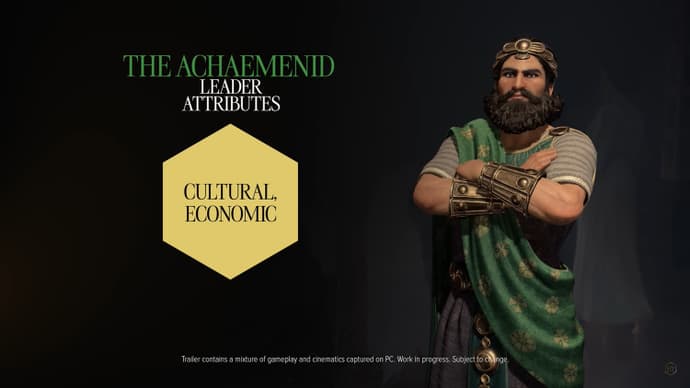
Credit: Civilization VII First Look Video
Xerxes inherited the Achaemenid Empire during a period of instability and guided it toward prosperity. After securing his domain through military campaigns, he focused on enriching his empire with infrastructure, completing major projects like the construction of Persepolis and an extensive road network. His legacy is reflected in both the monuments that symbolize his rule and the literature that commemorates his influence and the fear he instilled in his enemies.
Unique Ability: Silk Road
- Increased Trade Route limit with all other leaders.
- Creating a Trade Route or Road with a Merchant provides Culture and Gold per Age.
- Increased Culture and Gold per Age on Unique Buildings and Unique Improvements.
Xerxes’ leadership style aligns with Cultural and Economic attributes, emphasizing the value of trade and infrastructure. His agenda, Lord of Coin, strengthens his focus on controlling trade routes—relationships with players who have fewer trade routes than Xerxes will improve, while those with an equal or greater number will face a decrease in relationship.
Ideal for players seeking to build a prosperous and interconnected empire, Xerxes' strength lies in his ability to leverage trade and cultural developments for long-term growth. His ability to generate wealth through trade routes, alongside his increased economic output from Unique Buildings and Improvements, makes him a powerful leader for players focused on economic dominance and cultural expansion.
In summary
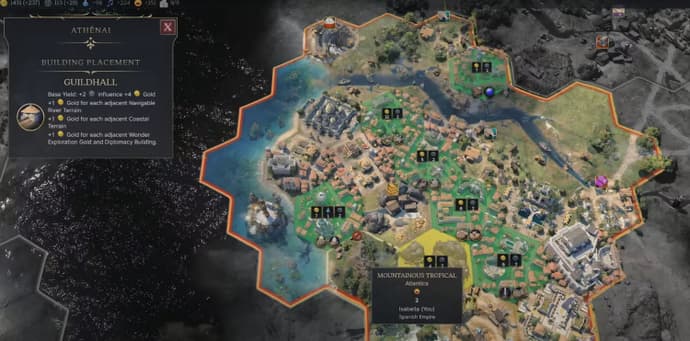
Among the leaders, there are standout figures who will undoubtedly be more popular than others, but the 26-leader pool will allow hardcore players to gain more new experiences, meaning they can explore the game for a longer time without getting bored. I felt the absence of another medieval queen, a representative of Ukrainian Cossacks, or a Galician king. However, it's gratifying to have two leaders representing the indigenous peoples of the lands that make up modern America.
Civ 7 has the potential to become the new favorite and surpass parts 5 and 6 in popularity. There are many great historical figures and innovations here that will provide a pleasant gaming experience, but only after the technical improvements are made.

Vitalii Diakiv writes gaming blogs and guides, focusing on the latest announcements and games matched with pop-cultural phenomena. Second, he covers esports events Counter-Strike 2, Marvel Rivals, League of Legends, and others.
 Roblox Anime Guardians Codes February 2026Discover all working Roblox Anime Guardians codes. Redeem for free Mystic Coins, Trait Rerolls, Artifacts, and rewards.
Roblox Anime Guardians Codes February 2026Discover all working Roblox Anime Guardians codes. Redeem for free Mystic Coins, Trait Rerolls, Artifacts, and rewards. Non-UK Online Casinos: Games, Formats, and What Players Can ExpectOnline casinos operating outside the UK gambling framework attract attention due to differences in licensing models, game portfolios, and promotional...
Non-UK Online Casinos: Games, Formats, and What Players Can ExpectOnline casinos operating outside the UK gambling framework attract attention due to differences in licensing models, game portfolios, and promotional... Bitcoin Casinos and Crypto Gambling Platforms for UK PlayersCrypto-based gambling platforms have become a noticeable segment of the global online casino market.
Bitcoin Casinos and Crypto Gambling Platforms for UK PlayersCrypto-based gambling platforms have become a noticeable segment of the global online casino market. Best International Online Casinos for UK PlayersThe online casino industry is an ever-rising sector acknowledged for its technology, extensive library of games, and the amount of revenue it generate...
Best International Online Casinos for UK PlayersThe online casino industry is an ever-rising sector acknowledged for its technology, extensive library of games, and the amount of revenue it generate...


